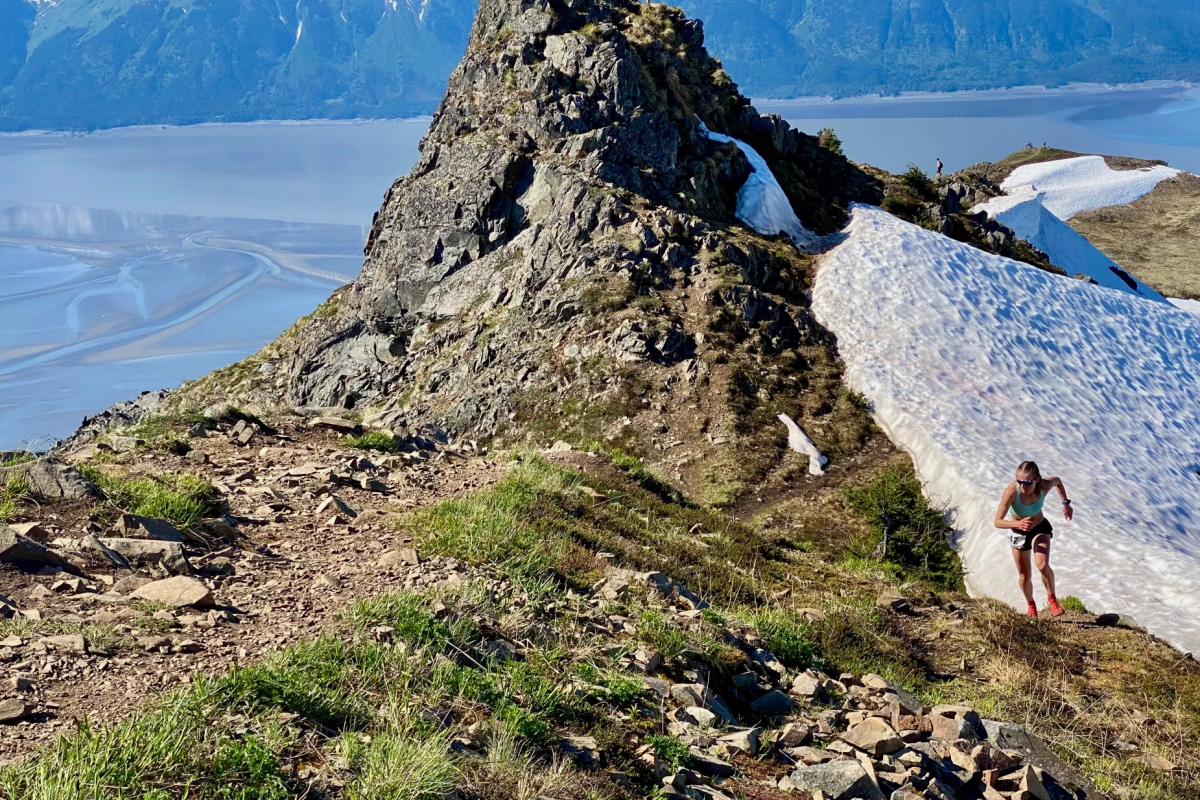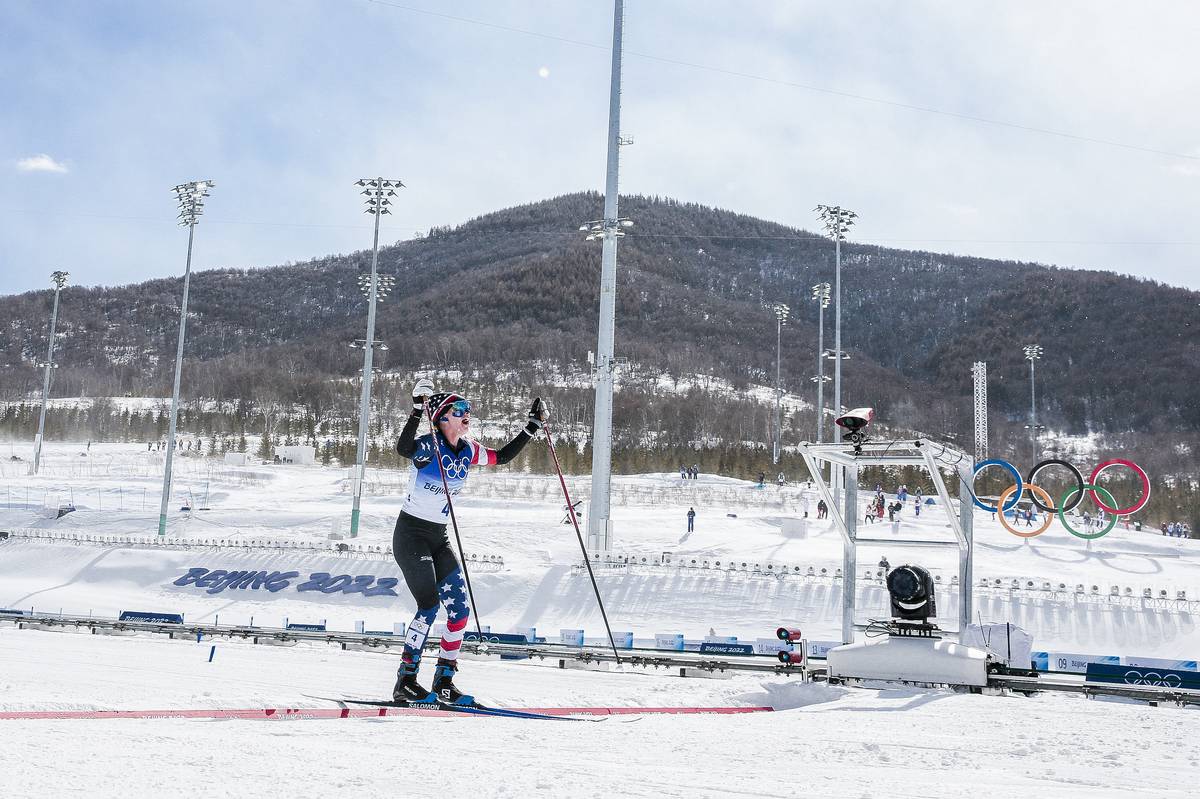
On February 20th, Jessie Diggins made Olympic history yet again, taking second in the 30 k mass start skate to round out the colors of her medal collection. Gold in the freestyle team sprint in 2018, silver in the 30 k skate, and bronze in the individual skate sprint.
Now thirty years old, Diggins is the most successful American cross country skier in Olympic history. She has spent over a decade rising to the top of American and international ski racing, elevating those around her as she reaches for goals that make us lose sight of the fact that the American women’s cross country program was only reinstated with funding in 2006.
There are currently thirty-nine pages of articles tagged with Diggins name on the FasterSkier archives, detailing the many steps forward, and backward, she has taken in her career, transforming her into the athlete, role model, and spokesperson she is today.
Her first tagged appearance was on January 25th, 2010 amid coverage of the Junior World Ski Championships in Hinterzarten, Germany. Both Diggins and Sophie Caldwell (now Hamilton) raced in the quarterfinals of the 1 k freestyle sprint that day, where Diggins crashed and ultimately finished 26th.
“50 meters into her quarterfinal here, Jessie Diggins found herself on the ground, seeing stars,” wrote one of FasterSkier’s young reporters, Nat Herz.
Perhaps it is fitting that 12 years later, following the press conference for Diggins’ Olympic silver medal, it was Herz who caught Diggins as she left, creating the opportunity for this unique interview. The following has been lightly edited for clarity and to account for the extreme wind at the venue, which significantly impaired the audio in a few places.
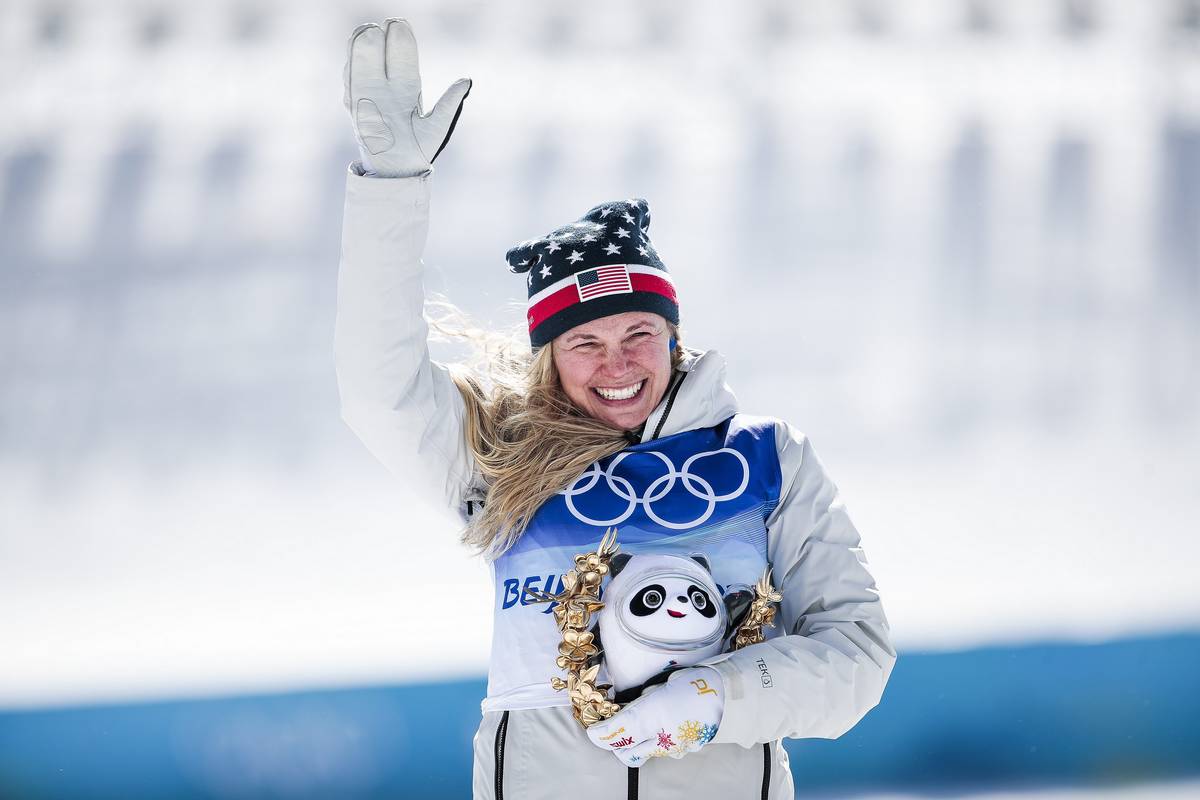
Nat Herz / FasterSkier: How are you feeling?
Jessie Diggins: Honestly, I’m feeling okay now. I haven’t felt that bad at the finish of a race maybe ever. It was a little scary. I couldn’t really walk. But also I’m not surprised, because like 24 hours ago I felt pretty awful too. It’s been a wild, wild last 48 hours.
***
Following the race, Diggins had shared with the media that came down with food poisoning the day before the race, leaving her unsure whether she would be able to line up for the final Olympic event, and if she did, what amount of fight would be left in her body.
Elaborating on what it had been like to cross the line in second place after this experience, Diggins said she felt “disbelief” and that mentally, she had been preparing herself to accept whatever outcome the day would behold. “You’ve had a great time [at these Games] and just do what you can to take care of yourself.”
Diggins continued by explaining the support she received leading into the race that allowed her to keep herself in the positive headspace she needed to perform.
JD: I had a great talk with my sport psychologist, my fiancé, and with my parents. They reminded me that this — the weather, the wind, it’s just like skiing at Giant’s Ridge in Minnesota when I was a kid. You know, I’m just gonna go out there and ski because I love to race and [we’ll] see what happens. My mom reminded me last night, ‘You don’t have to decide right now. Wait. Just see how you feel once you’re actually racing. And then see how you feel in another 5 k and another 5k. You don’t know right now and that’s okay.’ So I went from like, ‘Wow, this is not the race prep I envisioned’, like laying in bed force feeding myself oatmeal and soup from a can. I was really proud of the amount of sport drink I consumed… and I was just like, ‘Okay, we’re just gonna see what happens out there.’ And I just wanted to race because I love to race.
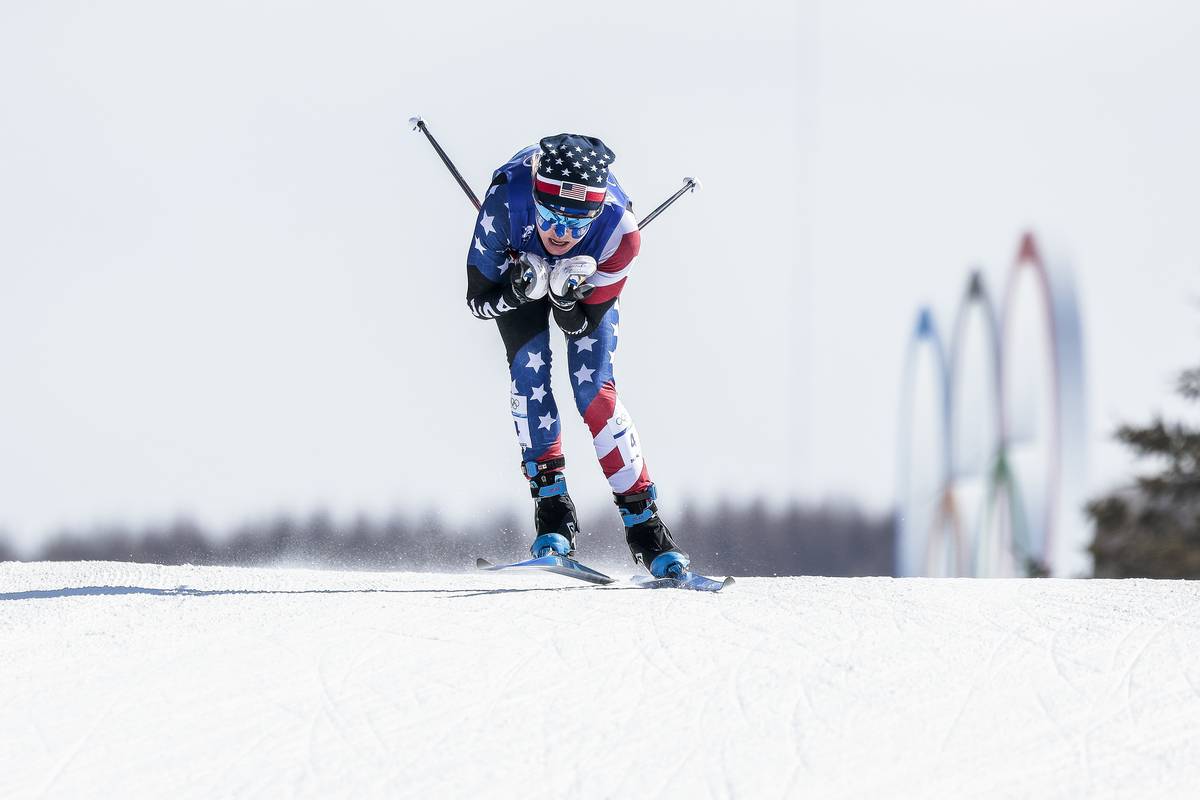
How she would feel while racing became apparent early. Diggins explained that by 12 or 13 k, her body was already beginning to fight against her efforts.
JD: I just kept trying to keep down some sugar and then my left knee started cramping and then my right quads and my left quads and my left hip. I tried to keep telling myself ‘Use your arms, use your arms.’
Grateful for the distraction and encouragement as she endured the pain of racing in that state, she expressed her gratitude from the support she received from the sidelines.
JD: I think we had like all of US Biathlon out there. The whole ski team was out there, all the techs. I mean, Oleg was cheering on the last lap, ‘We’re proud of you!’ And I was like, ‘I’m gonna cry.’ That was the coolest thing. Pretty much every other country also started cheering for me, and so I felt like the whole world was helping me get up those hills when my legs were just spasming and going numb. And I just kept thinking, ‘I’ve got to keep pushing as hard as I can, because at any point — what if my legs give out? I can’t back down. I can’t let up on this pace. I just have to keep going.’
FS: I imagine you were kind of on this seesaw between, ‘I’m in a medal winning position and I could fall over at any time…
JD: I was trying very hard to not think about that, and just think about using my arms, using my head — what I mean by that is like, I’d come over the top and it’s really windy, and I’m like, ‘Okay, I’m just going to doublepole.’ Or, ‘I’m gonna hold this tuck longer.’ Because it was the sustained climbs where I started to really cramp, so I kept thinking like, ‘Okay, I gotta ski as smart as I can, and be really thoughtful about where I use my legs and where I use my arms.’ Which is funny, because normally, I’m a legs skier, so that was a funny flip for me. I tried not to let myself think about a medal, because I had to stay focused on getting through the race, and not let myself think about anything else.
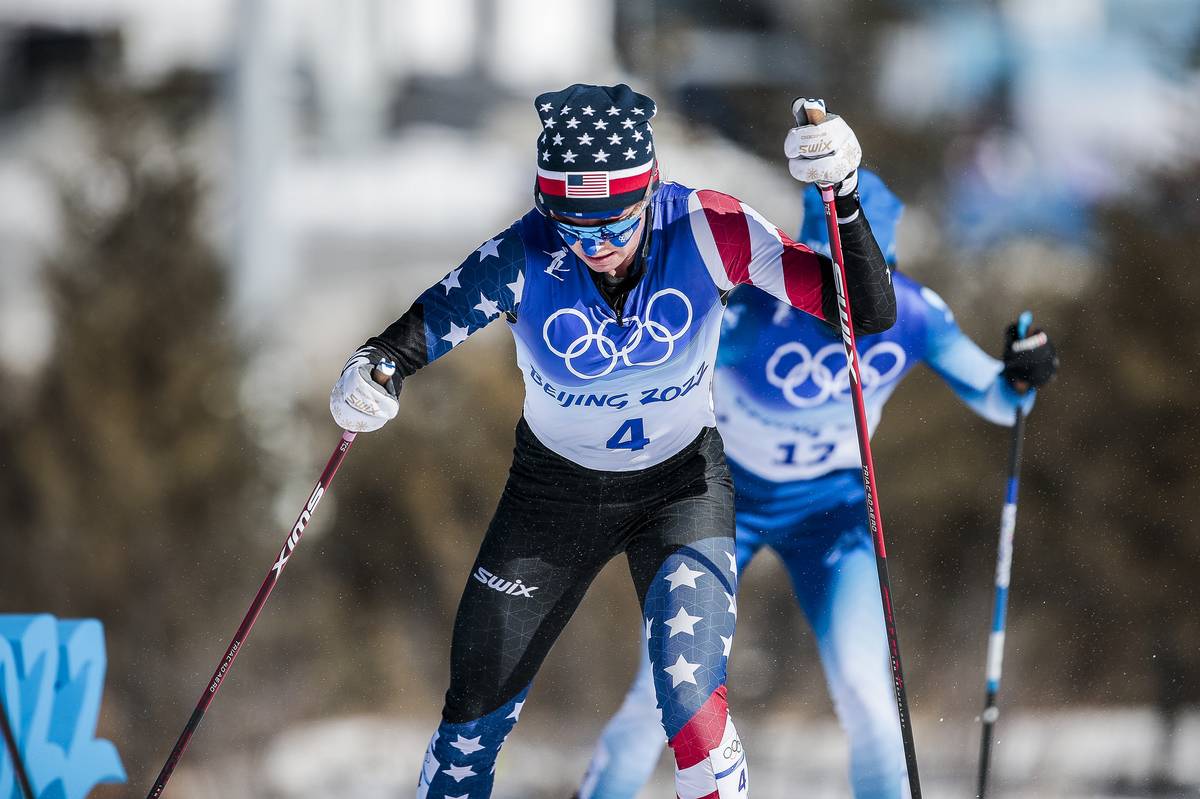
FS: When you think about the amount of pride you’re gonna feel in finishing that race the way that you did, when you’re ultimately able to look back on that, would you say this would rank up there in your catalog of things you’ve had to suffer through?
JD: I think that might have been the hardest thing I’ve ever done in my life. It might be. Finishing the Tour de Ski this year was also very hard, but that’s why I did it.
I told myself last night, nothing will probably feel harder than being actively sick and finishing that final climb. I’ve prepped for this. My head is tough as it is ever going to get, and I need that right now. And I’m grateful for all those super hard training sessions and all those super hard races where I finished, without being able to feel my legs at all because in the middle of the race [today], when my legs were spasming and I couldn’t really feel them, I was like, ‘This is not new.’ Unfortunately, which is probably medically concerning. But this is not a new thing for me, and so I know I can survive this.
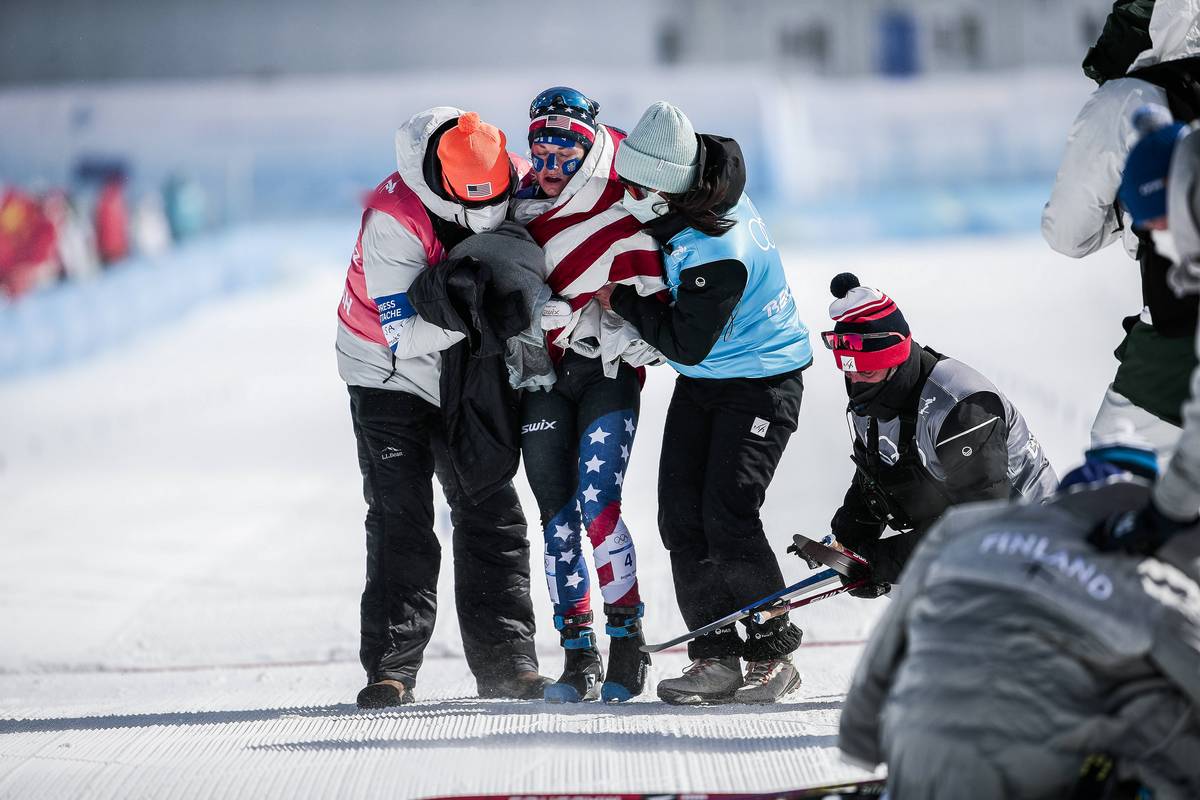
The other prominent storyline of the day was that Rosie Brennan knocked on the door of an Olympic medal yet again, perhaps helping Kerttu Niskanen of Finland to bronze, only to walk away empty handed herself in sixth place. Brennan had been fourth in the freestyle sprint the week before, and had tagged off to Diggins in third place after her final lap of the classic team sprint where the Americans finished fifth.
It was perhaps not altogether a very different Olympic experience from Diggins’ in PyeongChang in 2018, where she took fifth in two individual races, sixth in another, and seventh in the last. In the 10 k skate, Diggins fifth place meant she was the first woman not to earn a medal, as Marit Bjørgen (NOR) and Krista Pärmäkoski (FIN) had tied for third.
FS: When you think about Rosie’s results today, and here, just overall. Is there anything you would want to say about that, because you’ve sort of similar positions — fourth places, tough spots.
JD: I do know how that feels, and I think it’s so important to remember that nobody gets to say if that was a good race or not but Rosie. Nobody gets to judge. Nobody gets to criticize. She’s the one who gets to define what success looks like. And personally, I’m just so proud of her. I mean, the Olympics is an emotional roller coaster. And she rode it with grace, and as a good teammate, and looked out for other people. She’s just been amazing. And to me, she found success in every definition that matters.
FS: If you were Rosie, would you be proud of your races?
JD: Yeah, I would. Because when I was fourth [in the 10 k skate in PyeongChang], or fifth because of the tie, I was proud. When you give it everything you have in a race, you can and you should be proud. And I think that’s that.

Rachel Perkins
Rachel is an endurance sport enthusiast based in the Roaring Fork Valley of Colorado. You can find her cruising around on skinny skis, running in the mountains with her pup, or chasing her toddler (born Oct. 2018). Instagram: @bachrunner4646

